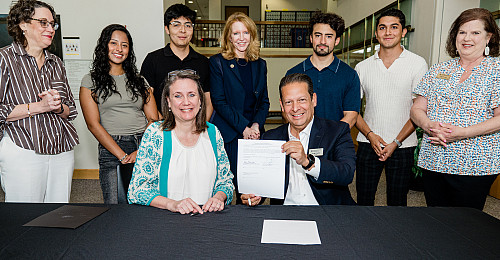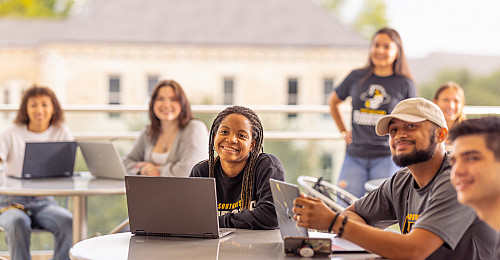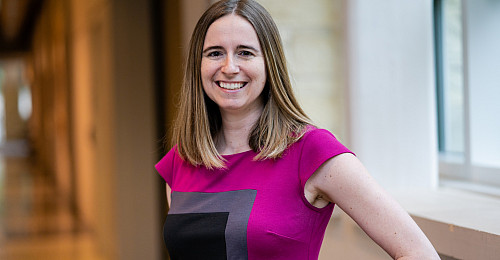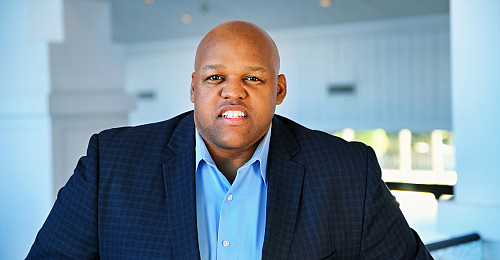
A U.S. Army veteran himself, Johnathon Melamed ’25 prioritized supporting his fellow student veterans, all while managing his own small business, supporting his family, and revitalizing his community.
more information
Enjoy highlights from the Commencement Convocation Ceremony celebrating the Southwestern University Class of 2025.
more information
With computer-aided design and 3D printing skills increasingly in demand across a variety of industries, Southwestern University students will soon have another avenue to sharpen their technical knowledge.
more information
Samuel Hoffman ’27 and Ethan Wilcox ’26 were each awarded $40,000 scholarships from The Sumners Foundation for their studies at Southwestern University.
more information
Southwestern’s new Certificate in Legal Studies is designed to prepare students to engage with questions of the law in today’s society by exploring the applications, contexts, and consequences of law.
more information
Southwestern students will soon have the opportunity to study abroad at Universidad de la Libertad in Mexico City.
more information
Southwestern and Texas A&M are teaming up to provide opportunities for SU students interested in pursuing graduate business programs at TAMU.
more information
Pre-nursing graduates from Southwestern will now have the opportunity to earn their Bachelor of Science in Nursing from Baylor’s Louise Herrington School of Nursing in as little as 12 months.
more information
After nearly a decade of bonding over patty melts and honey bbq chicken strip sandwiches, the Southwestern University football team’s offensive line recently became the star of a national Whataburger marketing campaign.
more information
Pillars in the Georgetown community, the Brightwells left a $1 million estate gift to Southwestern University.
more information
Military Friendly® has honored Southwestern with a Silver Award to recognize the University’s inclusivity efforts for the military community.
more information
A U.S. Army veteran himself, Johnathon Melamed ’25 prioritized supporting his fellow student veterans, all while managing his own small business, supporting his family, and revitalizing his community.
more information
Enjoy highlights from the Commencement Convocation Ceremony celebrating the Southwestern University Class of 2025.
more information
With computer-aided design and 3D printing skills increasingly in demand across a variety of industries, Southwestern University students will soon have another avenue to sharpen their technical knowledge.
more information
Samuel Hoffman ’27 and Ethan Wilcox ’26 were each awarded $40,000 scholarships from The Sumners Foundation for their studies at Southwestern University.
more information
Southwestern’s new Certificate in Legal Studies is designed to prepare students to engage with questions of the law in today’s society by exploring the applications, contexts, and consequences of law.
more information
Southwestern students will soon have the opportunity to study abroad at Universidad de la Libertad in Mexico City.
more information
Southwestern and Texas A&M are teaming up to provide opportunities for SU students interested in pursuing graduate business programs at TAMU.
more information
Pre-nursing graduates from Southwestern will now have the opportunity to earn their Bachelor of Science in Nursing from Baylor’s Louise Herrington School of Nursing in as little as 12 months.
more information
After nearly a decade of bonding over patty melts and honey bbq chicken strip sandwiches, the Southwestern University football team’s offensive line recently became the star of a national Whataburger marketing campaign.
more information
Pillars in the Georgetown community, the Brightwells left a $1 million estate gift to Southwestern University.
more information
Military Friendly® has honored Southwestern with a Silver Award to recognize the University’s inclusivity efforts for the military community.
more information
A U.S. Army veteran himself, Johnathon Melamed ’25 prioritized supporting his fellow student veterans, all while managing his own small business, supporting his family, and revitalizing his community.
more information
Enjoy highlights from the Commencement Convocation Ceremony celebrating the Southwestern University Class of 2025.
more information
With computer-aided design and 3D printing skills increasingly in demand across a variety of industries, Southwestern University students will soon have another avenue to sharpen their technical knowledge.
more information
Samuel Hoffman ’27 and Ethan Wilcox ’26 were each awarded $40,000 scholarships from The Sumners Foundation for their studies at Southwestern University.
more information
Southwestern’s new Certificate in Legal Studies is designed to prepare students to engage with questions of the law in today’s society by exploring the applications, contexts, and consequences of law.
more information
Southwestern students will soon have the opportunity to study abroad at Universidad de la Libertad in Mexico City.
more information
Southwestern and Texas A&M are teaming up to provide opportunities for SU students interested in pursuing graduate business programs at TAMU.
more information
Pre-nursing graduates from Southwestern will now have the opportunity to earn their Bachelor of Science in Nursing from Baylor’s Louise Herrington School of Nursing in as little as 12 months.
more information
After nearly a decade of bonding over patty melts and honey bbq chicken strip sandwiches, the Southwestern University football team’s offensive line recently became the star of a national Whataburger marketing campaign.
more information
Pillars in the Georgetown community, the Brightwells left a $1 million estate gift to Southwestern University.
more information
Military Friendly® has honored Southwestern with a Silver Award to recognize the University’s inclusivity efforts for the military community.
more information
A U.S. Army veteran himself, Johnathon Melamed ’25 prioritized supporting his fellow student veterans, all while managing his own small business, supporting his family, and revitalizing his community.
more information
Enjoy highlights from the Commencement Convocation Ceremony celebrating the Southwestern University Class of 2025.
more information
With computer-aided design and 3D printing skills increasingly in demand across a variety of industries, Southwestern University students will soon have another avenue to sharpen their technical knowledge.
more information
Samuel Hoffman ’27 and Ethan Wilcox ’26 were each awarded $40,000 scholarships from The Sumners Foundation for their studies at Southwestern University.
more information
Southwestern’s new Certificate in Legal Studies is designed to prepare students to engage with questions of the law in today’s society by exploring the applications, contexts, and consequences of law.
more information
Southwestern students will soon have the opportunity to study abroad at Universidad de la Libertad in Mexico City.
more information
Southwestern and Texas A&M are teaming up to provide opportunities for SU students interested in pursuing graduate business programs at TAMU.
more information
Pre-nursing graduates from Southwestern will now have the opportunity to earn their Bachelor of Science in Nursing from Baylor’s Louise Herrington School of Nursing in as little as 12 months.
more information
After nearly a decade of bonding over patty melts and honey bbq chicken strip sandwiches, the Southwestern University football team’s offensive line recently became the star of a national Whataburger marketing campaign.
more information
Pillars in the Georgetown community, the Brightwells left a $1 million estate gift to Southwestern University.
more information
Military Friendly® has honored Southwestern with a Silver Award to recognize the University’s inclusivity efforts for the military community.
more information
A U.S. Army veteran himself, Johnathon Melamed ’25 prioritized supporting his fellow student veterans, all while managing his own small business, supporting his family, and revitalizing his community.
more information
Enjoy highlights from the Commencement Convocation Ceremony celebrating the Southwestern University Class of 2025.
more information
Samuel Hoffman ’27 and Ethan Wilcox ’26 were each awarded $40,000 scholarships from The Sumners Foundation for their studies at Southwestern University.
more information
After nearly a decade of bonding over patty melts and honey bbq chicken strip sandwiches, the Southwestern University football team’s offensive line recently became the star of a national Whataburger marketing campaign.
more information
Pillars in the Georgetown community, the Brightwells left a $1 million estate gift to Southwestern University.
more information
The field at the new multi-purpose sports complex will be named in honor of Kevin and Elizabeth Dice for their generous donation to the facility.
more information
Erika (Sehne) Munch, M.D. ’04 has helped hundreds of patients experience the joys of parenthood through her role as a reproductive endocrinologist at Texas Fertility Center.
more information
Southwestern’s unique approach to a liberal arts education, paired with passionate faculty and small class sizes, has put countless students on a path to success in law.
more information
A new era for Pirates men’s basketball is underway as Matt Streich takes the helm, bringing over a decade of coaching experience at the NCAA Division III level to Southwestern.
more information
Garey Chair and Professor of Mathematics Alison Marr uses her own experiences as a female mathematician to inspire the next generation of learners while also playing a pivotal role in enhancing the Southwestern community.
more information
After celebrating 20 years with the American Heart Association and moving into a new national role, political science major Eric Batch ’97 looks back at his time at Southwestern and how it inspired him to change the world.
more information- <div class="page__wallpaper" style="background-image: url(/live/image/gid/142/width/800/height/1200/25741_150410_SU_WLAX_Baltimore_7912.rev.1509137165.jpg);"></div>
- <div class="page__wallpaper" style="background-image: url(/live/image/gid/142/width/800/height/1200/25736_121004F_1229.rev.1509136857.jpg);"></div>
ERROR 404
We’re sorry, but we can’t find the page you’re looking for.
Please use the navigation above or search here.
Southwestern Home
